Chinchillas are unique, adorable, and fascinating pets that require special care and attention. If you’re considering a chinchilla pet, it’s essential to understand their needs, costs, and maintenance to ensure a happy and healthy companion.
Chinchilla Behavior and Temperament
Chinchillas are largely nocturnal, which means they will be most active at night. Sometimes they are called crepuscular, meaning their activity peaks at dawn and dusk. In any case, they should be kept in a fairly quiet area during the day. And while they are mostly quiet animals, their nighttime movements might keep some people awake if their enclosure is close to your bed.
Pet chinchillas don’t often bite, especially when they are handled from a young age.1 You must be gentle and consistent to gain the trust of a chinchilla. It can take some time to get a chinchilla used to your hands. And some chinchillas will never really like to be held much. They’d rather be exploring, or they might prefer to climb on you rather than being restrained. But by moving slowly and being patient, you often can get even the timidest chinchilla used to handling.
Chinchillas can be kept singly and will usually do fine in same-sex pairs, especially if the two chinchillas are littermates or are introduced at a young age. Keep chinchillas away from other household pets to avoid any stress or injuries.
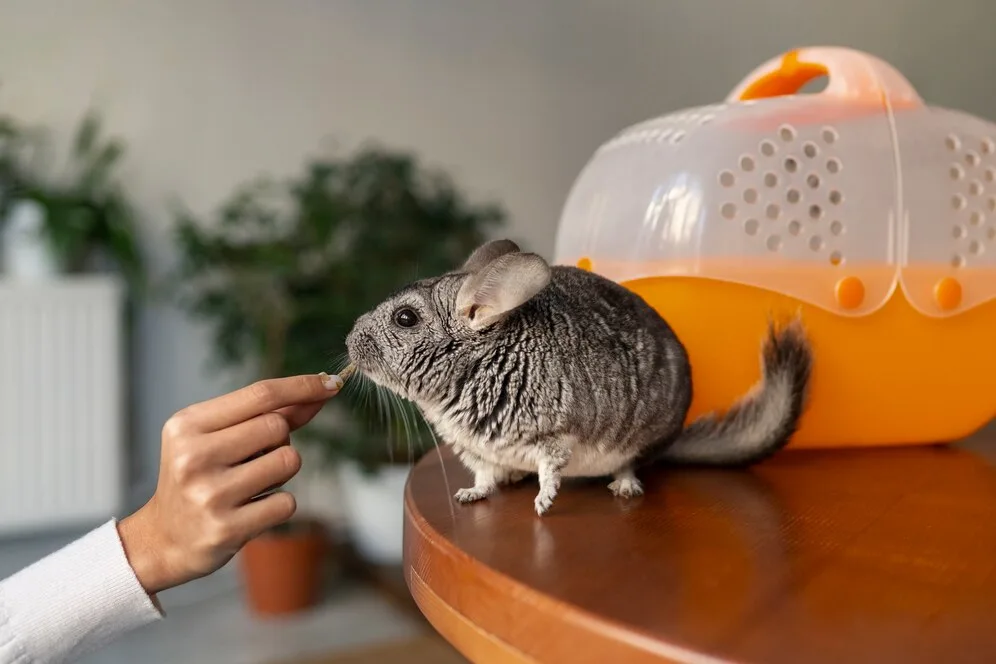
Size Information
Chinchillas usually stretch around 9 to 14 inches long with their tail adding a few more inches. They typically weigh less than 2 pounds, with the females being slightly larger than the males.
Chinchilla Care and Habitat
Proper chinchilla care is crucial to keeping your pet healthy and active. Chinchillas need a spacious chinchilla cage with multiple levels, platforms, and ramps. The cage should be well-ventilated with a solid base, as wire flooring can harm their feet. Provide safe bedding such as paper-based materials and avoid cedar or pine shavings, which can cause respiratory issues.
1. Provide a Proper Cage
- Size: The cage should be large enough for your chinchilla to move around freely. Ideally, the cage should be at least 24 inches deep, 24 inches wide, and 36 inches tall for one chinchilla. The bigger, the better!
- Bar spacing: Ensure the bars are no more than 1 inch apart to prevent escapes.
- Levels and shelves: Chinchillas love to climb, so provide ramps or shelves at different heights to keep them active and entertained.
- Flooring: Avoid wire flooring as it can hurt their feet. Use a solid floor, or cover the wire floor with a smooth, soft bedding.
2. Temperature and Humidity Control
- Chinchillas are very sensitive to heat. Keep the room temperature between 60-70°F (16-21°C) and avoid humidity above 60%. They can easily overheat and suffer from heatstroke if it’s too hot or humid.
- Avoid placing the cage in direct sunlight or near heat sources like radiators or air conditioners.
3. Diet
- Hay: The foundation of their diet should be high-quality hay, like timothy hay, which is rich in fiber and good for their digestion.
- Pellets: Provide a small amount of chinchilla pellets daily, but avoid mixes with seeds or dried fruit as they can be too sugary.
- Fresh Water: Always provide fresh water in a water bottle or bowl.
- Treats: Occasionally, you can give them small treats like fresh fruits and vegetables, but avoid sugary or acidic foods like citrus fruits.
Read more : 10 Best Chinchilla Food For a Healthy Diet (Review & Guide)
4. Dust Baths
- Chinchillas have dense fur, and unlike other animals, they cannot get wet. Instead, they need a dust bath to clean their fur and prevent oils from building up.
- Offer a special dust bath for about 10-15 minutes, 2-3 times a week. Make sure the dust is specifically made for chinchillas (available at pet stores).
- Never bathe them with water as it can cause fur to mat or lead to skin issues.
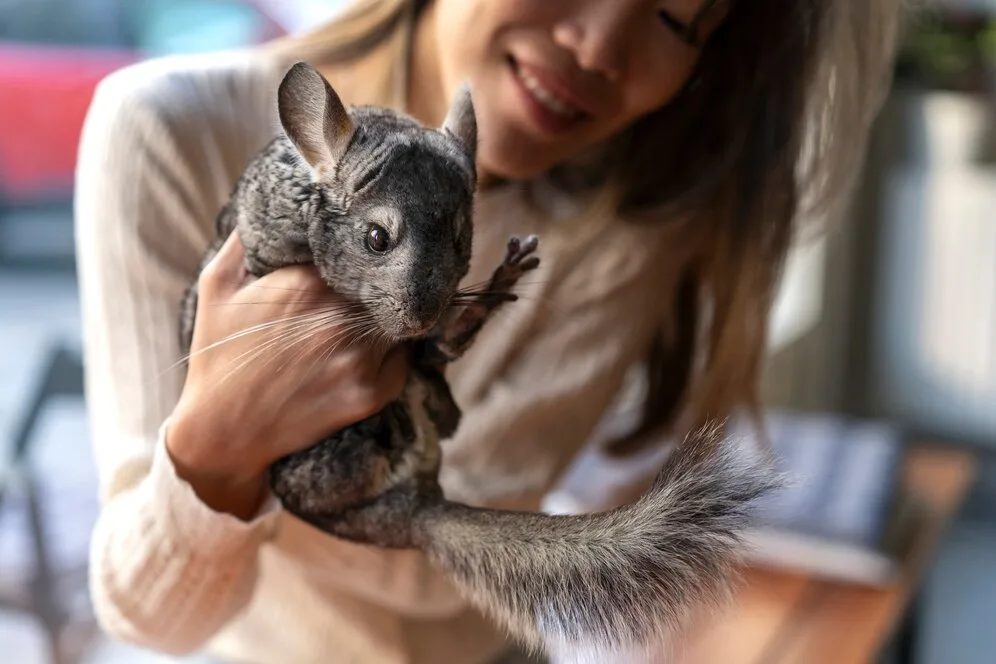
5. Exercise and Enrichment
- Toys: Chinchillas need plenty of toys to chew on (like untreated wood, pumice stones, or cardboard). Chewing helps keep their teeth healthy, as they grow continuously.
- Out-of-cage time: If possible, allow your chinchilla time outside of its cage in a safe, chinchilla-proofed area to run and play. Make sure to supervise them during this time to avoid any accidents.
- Climbing structures: Create tunnels, ramps, and hammocks inside the cage for mental stimulation and exercise.
6. Handling and Socialization
- Chinchillas can be skittish, so it’s important to handle them gently and calmly. Start by letting them come to you on their own.
- Hold them securely with both hands (supporting their body and feet) when you do pick them up. Be aware that they can jump surprisingly high, so be careful.
- Chinchillas are social creatures, so it’s a good idea to have more than one if you can. But, always be mindful of proper introductions if you’re considering adding another chinchilla.
7. Health Monitoring
- Regularly check your chinchilla’s teeth, eyes, and ears for signs of infection or abnormalities. If you notice anything unusual, it’s best to consult a vet.
- Dental care: Their teeth grow continuously, so chewing on hay and toys helps keep them filed down. If you notice your chinchilla is not eating or seems to have difficulty chewing, a vet visit is necessary.
- Keep an eye on their poop. Healthy poop should be small, round, and firm. If you notice any changes, it could indicate a dietary or health issue.
8. Grooming
- Chinchillas are naturally clean animals, and their dense fur doesn’t require much grooming. However, you should brush them occasionally (especially if they are shedding or during warmer months).
- Their nails may need to be trimmed regularly if they don’t naturally wear them down.
9. Vet Care
- It’s essential to have an exotic animal vet who has experience with chinchillas for regular check-ups. Regular vet visits can help prevent and catch any health issues early.
10. Lifespan
- Chinchillas have a relatively long lifespan of 10-20 years, so they are a long-term commitment. Make sure you’re ready for the responsibility before bringing one into your home.
By providing a proper living environment, diet, and mental stimulation, you’ll be able to enjoy a happy and healthy chinchilla as a pet!
Chinchilla Cost and Price
Owning a chinchilla involves various costs. The initial chinchilla price ranges between $150-$400, depending on the breed, age, and breeder. Additional costs include:
- Chinchilla cage: $100-$300
- Food and hay: $20-$40 per month
- Toys and accessories: $50-$100
- Vet for chinchilla visits: $50-$150 per checkup
- Annual expenses: $500-$1,000
Although the chinchilla cost may seem high initially, the long-term investment ensures a quality life for your pet.
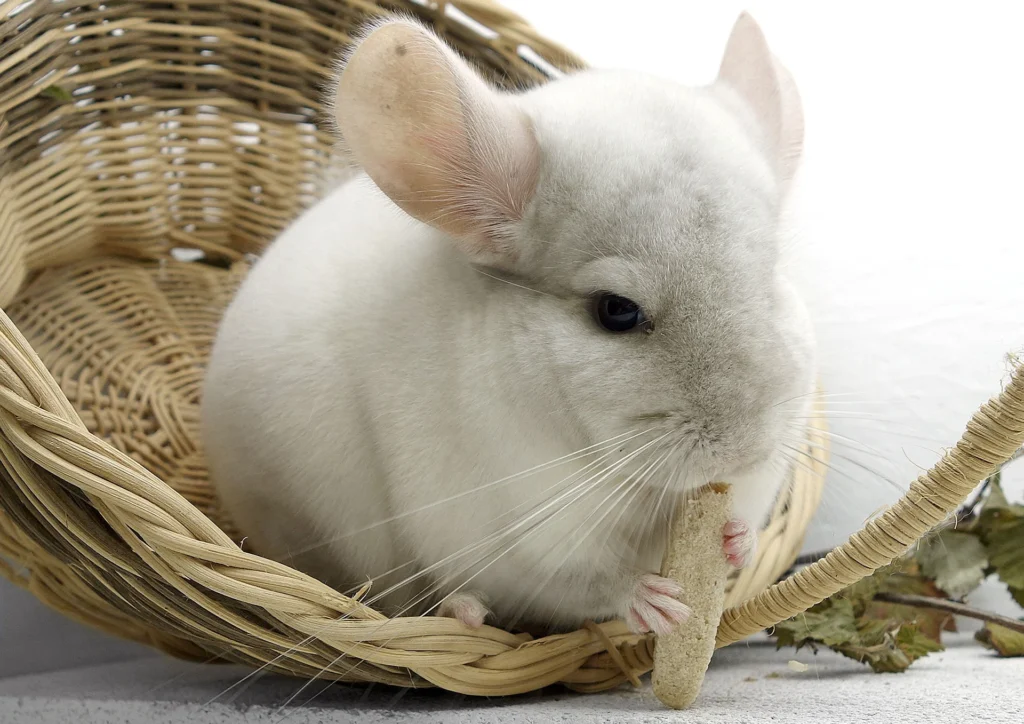
Buying a Chinchilla
When searching for a pet chinchilla for sale, it’s best to buy a chinchilla from a reputable breeder or rescue organization. Avoid purchasing from pet stores that may not provide proper care or health checks. Look for active, well-groomed chinchillas with bright eyes and a clean coat.
If you’re looking for a chinchilla for sale or a chinchilla animal for sale, research breeders thoroughly, ask about their care routines, and ensure they are ethical. You may also find chinchillas for adoption at rescue centers.
Reproduction/Breeding
Check with local exotic animal veterinarians for recommendations on a good chinchilla breeder or rescue group. The main benefit of a breeder is you’ll likely have a wider selection of younger animals. However, chinchillas at rescue groups are often already tame.
Ask to see the animals before selecting one to make sure they’re kept in a sanitary environment and appear to be in good body condition. And if you’ll be bringing home more than one chinchilla, make sure they’re the same sex to avoid accidentally becoming a breeder.
Pros and Cons of Keeping a Chinchilla as a Pet
Here’s a table summarizing the pros and cons of keeping a chinchilla as a pet:
| Pros | Cons |
|---|---|
| Cute and Endearing: Adorable with soft, fluffy fur and big eyes. | Sensitive to Heat: Cannot tolerate temperatures over 80°F (27°C) and need cool, dry environments. |
| Low Odor: Chinchillas have little to no smell when kept clean. | Expensive to Care For: Costs for cage, bedding, food, and vet care can add up. |
| Long Lifespan: Can live 10-20 years with proper care. | High Energy and Need for Attention: Need daily interaction and exercise, or they may get bored. |
| Good for Small Spaces: They don’t require much space but need a large cage. | Fragile and Delicate: Need gentle handling, as they can get injured easily. |
| Intelligent and Trainable: Can learn tricks and be litter-box trained. | Nocturnal Behavior: Active at night, which may be disruptive to light sleepers. |
| Low Maintenance Grooming: Only need dust baths, not regular water baths. | Not Ideal for Small Children: They require gentle handling and may not be a good fit for young kids. |
| Social and Playful: Can form strong bonds with owners and enjoy interactive play. | Chewing Habits: Tend to chew on furniture and cables if not supervised or chinchilla-proofed. |
| Specialized Diet: Must be fed the right foods (hay, pellets), avoiding sugary treats. | |
| Potential for Dental Problems: Continuous tooth growth requires plenty of chewing material. |
Common Health Problems
Chinchillas are subject to a few common health problems, including:
- Respiratory infections
- Digestive issues
- Heat stroke
- Skin problems
- Overgrown or impacted teeth
- Bite wounds and other injuries
If your chinchilla is showing signs of illness, immediately consult a veterinarian. Meanwhile, keep it in a quiet spot and avoid handling it to reduce stress.
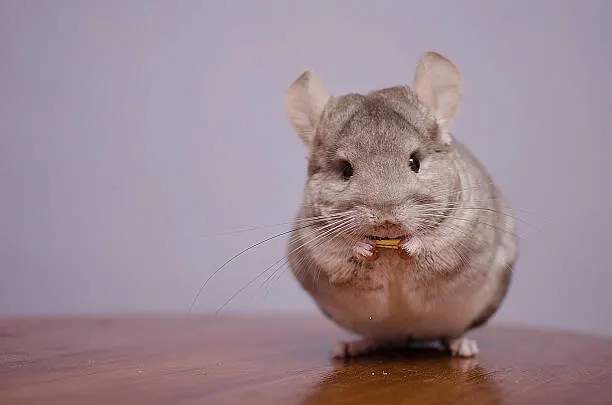
People Also Ask:
Are chinchillas good house pets?
Yes, chinchillas can be excellent house pets for dedicated owners. They are clean, quiet, and have minimal odor. However, they require a commitment of 10-15 years, daily care, and a proper environment to thrive. While they may not be as affectionate as dogs or cats, they can form strong bonds with their owners when handled correctly.
What are the downsides of owning a chinchilla?
Chinchillas require specific care, making them less ideal for casual pet owners. They are delicate, need a temperature-controlled environment, and require daily maintenance. Additionally, chinchillas are not naturally cuddly, and improper handling can lead to stress or injury. Veterinary care can also be costly, as exotic animal specialists are needed.
Do pet chinchillas like to be held?
Most chinchillas do not enjoy being held, as they are prey animals that prefer to stay active and explore. Some may tolerate short periods of handling if trained from a young age, but they usually prefer interaction on their terms. Instead of forcing cuddles, allow your chinchilla to come to you for treats and playtime.
Are chinchillas high maintenance?
Chinchillas require moderate to high maintenance compared to other small pets. They need a spacious cage, daily dust baths, a specialized diet, and consistent socialization. Their environment must be kept cool, and they require regular vet checkups. While not extremely demanding, they do require committed care.
Do chinchilla cages smell?
No, chinchillas themselves do not have a strong odor, and their cages only smell if not properly maintained. Regular cleaning, proper bedding, and removing soiled areas daily will prevent any unpleasant smells. Unlike other small pets, chinchillas do not produce strong-smelling urine.
What not to do with a chinchilla?
Avoid holding them too tightly or grabbing them by the tail, as this can cause severe injuries. Never bathe them in water—only use dust baths. Do not expose them to high temperatures, feed them sugary or fatty foods, or house them with other pets like rabbits, which may carry harmful bacteria.
What is the easiest pet to take care of?
While chinchillas require more maintenance than hamsters or guinea pigs, they are easier to care for than high-maintenance pets like dogs. They are independent, require minimal grooming, and do not need vaccinations, but they do need a specialized diet and a cool environment.
Are chinchillas expensive?
The initial chinchilla cost, cage, and setup can be expensive. Additionally, their specialized diet, vet visits, and potential emergency medical costs add up. However, they do not require vaccinations or frequent medical treatments like some other pets.
Do chinchillas show love?
Chinchillas can form strong bonds with their owners and show affection in subtle ways. They may climb on you, take treats from your hand, or make soft chirping noises when happy. While they are not cuddly, they enjoy interaction and playtime with their trusted humans.
Do chinchillas like TV?
Chinchillas have sensitive hearing, so loud noises can stress them. However, they may enjoy the soft background noise of a TV, especially nature sounds or calm voices. Avoid playing loud music or sudden noises, as they can startle your pet.
Do chinchillas cry?
Chinchillas do not cry tears like humans, but they make vocalizations to express emotions. A distressed or frightened chinchilla may make high-pitched squeaks, while a relaxed one may produce soft chirping sounds. If your chinchilla is making loud, repetitive noises, it may indicate discomfort or stress.
How to tell if a chinchilla is mad?
An angry or annoyed chinchilla may bark, growl, or lunge. Signs of irritation include flattened ears, rapid tail flicking, or backing away from interaction. If your chinchilla displays these behaviors, give it space and avoid handling until it calms down.
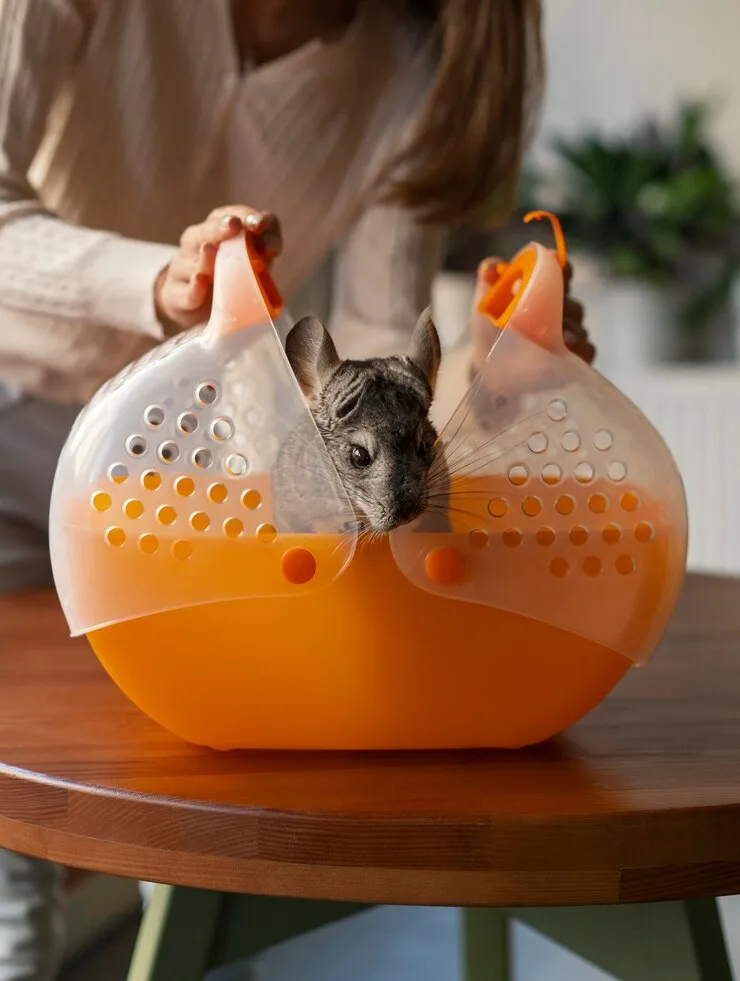
Conclusion
Chinchillas make wonderful pets for the right owner. While they require specific care, the rewards of owning a chinchilla pet are immense. If you’re ready to commit to their needs, find a reputable breeder or rescue center offering a chinchilla for sale. With proper care, a pet chinchilla can bring joy and companionship for many years.
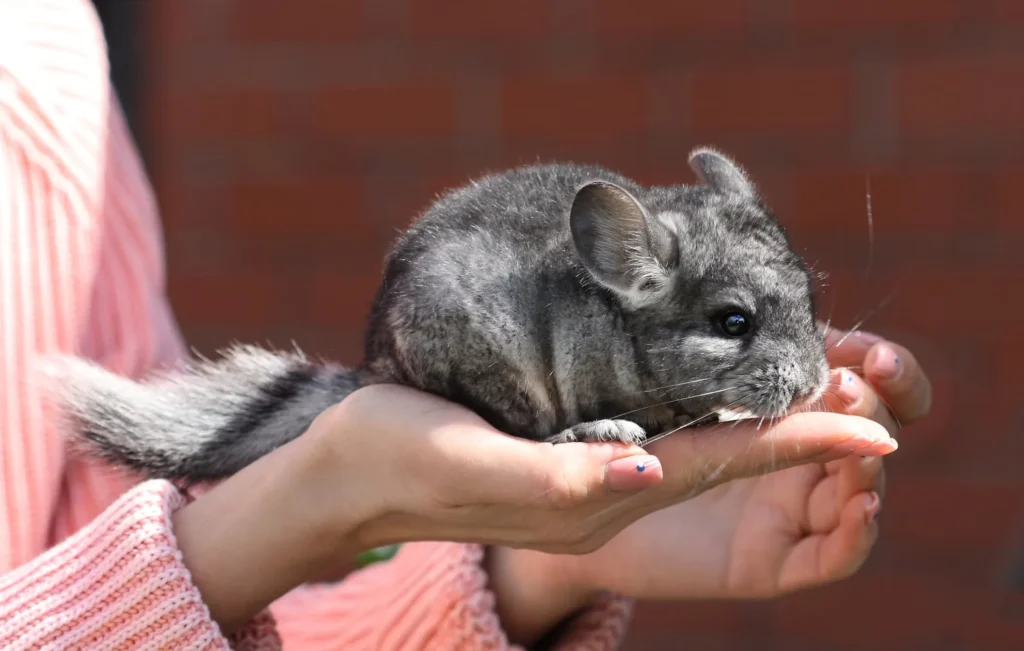
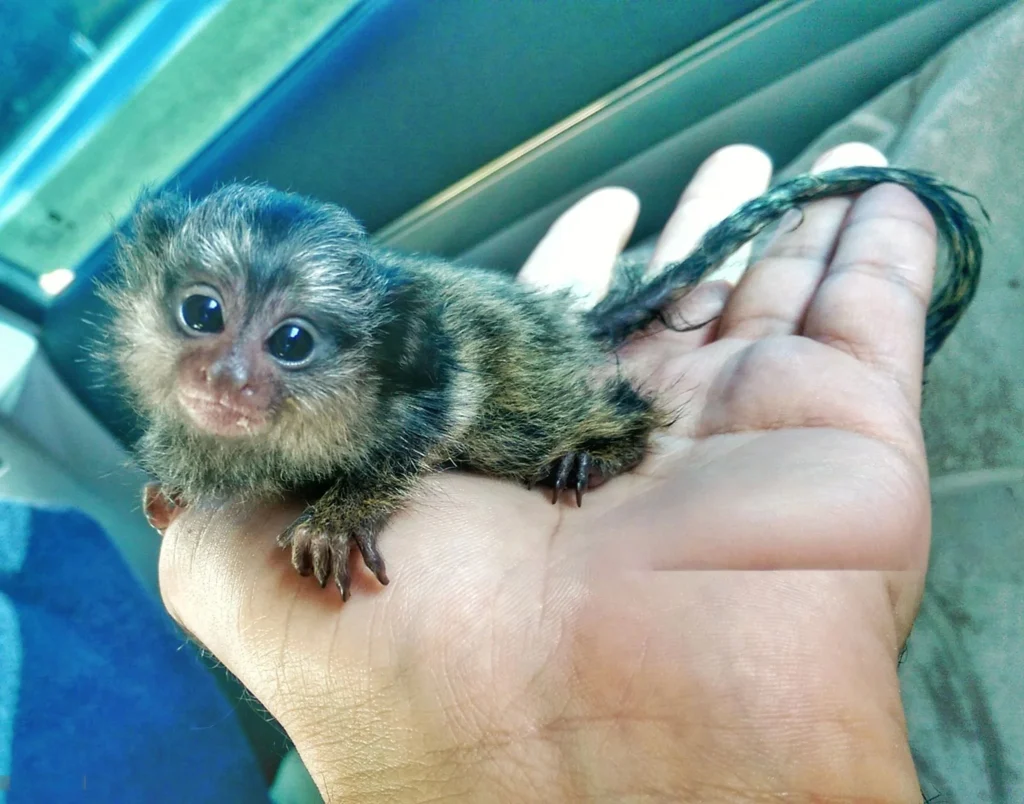
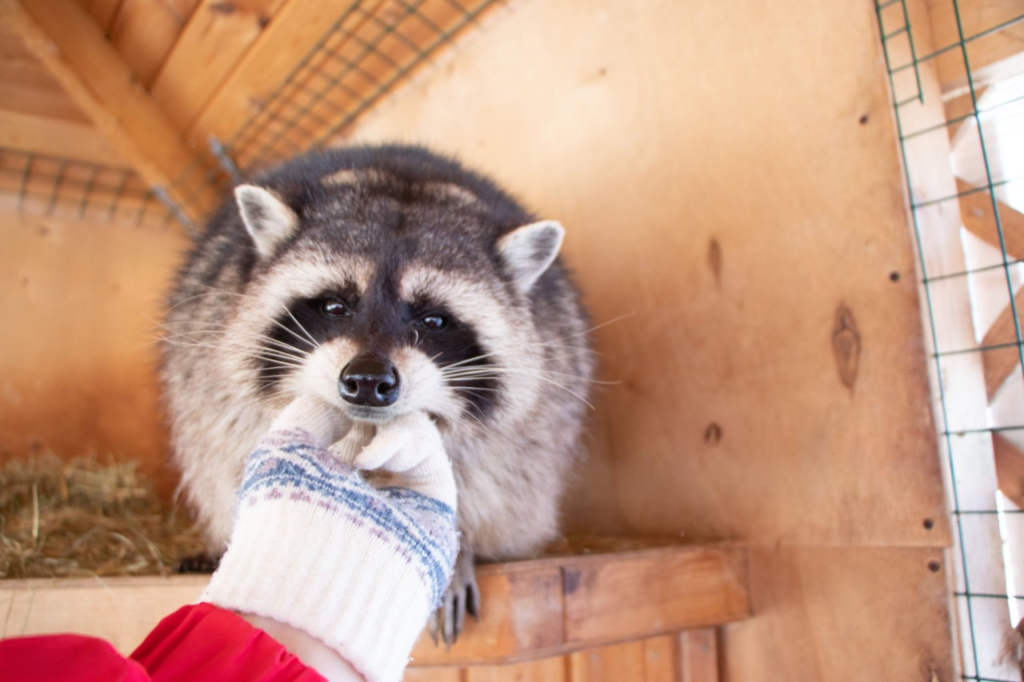
Its not bad idea having Chinchilla as a pet as i think its so calm and he even good for the kids
do y think its really good idea if i pet Chinchilla !!!!!
Afer reading ur article abaout Chinchilla pet, i should say its not easy but thank u for the information